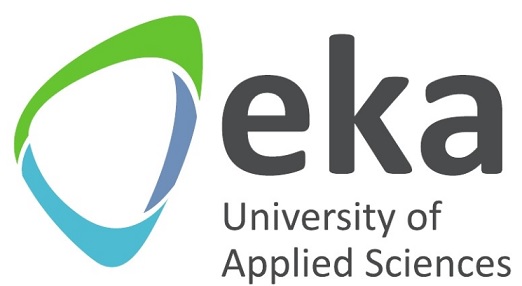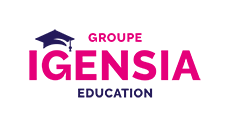EKA University of Applied Sciences


Strengths
EKA University of Applied Sciences was founded in 1998.
EKA is a member of the Baltic University Program, which brings together 160 universities in 14 countries in the Baltic Sea region.
In 2022, EKA is ranked first in the U-Multirank ranking of Latvia’s private higher education institutions.
In October 2022, the EKA received the Baltic Management Development Association (BMDA) Innovation Award.
Major, Academic
Lectures in English
Campus
EKA offers a modern study environment – real and virtual conference rooms, a modern library where you’ll find a wide variety of books and periodicals, audio and video material, an electronic database and informative Internet resources in Russian, English, German and other languages.
To discover
The capital of Latvia, Riga is the most beautiful of the Baltic capitals.
Riga is a city that can be explored on foot. From the elegant historic old town, Vecrïga, on the banks of the Gauvada River, to the dynamic center and Maskavas district, Riga reveals its many treasures.
A trip to Riga is first and foremost a voyage of discovery of Art Nouveau. The city is packed with houses and Art Nouveau buildings that will win you over, a World Heritage treasure.
Riga is accessible by air, rail and ferry, and is a major port between Eastern and Western Europe.
It is characterized by a dynamic business environment and offers a high quality of life with a very low crime rate. Young people can speak more than 3 languages.
Activities not to be missed: visit Riga’s Old Town and the superb House of the Black Heads, stroll through the Centrs district: for its art nouveau architecture and local life. Don’t forget to explore nature by bike: by the Baltic Sea, in the Botanical Gardens, in the Mezapark Forest City or in the Ethnographic Park. Head to the Bibliotheque Nationale for a beautiful view of the city, free exhibitions and a cheap canteen.
And don’t miss the Central Market, Europe’s largest covered market, or the flea market. Located in the Moscow district, you’ll find completely outdated electronics, old bicycle parts of all kinds, old cameras, lots of items from the Communist or Nazi period (parts of uniforms, buttons, weapons…) and lots of other old junk.
Good to know
Latvia (and Estonia and Lithuania too) gained independence at the end of WW1, allowing them to leave the Russian Empire.
But the peace was short-lived, as in 1939 Nazi Germany and the Soviet Union agreed to annex certain countries. Following this treaty, the Red Army invaded Latvia and the other Baltic states with the firm intention of “sovietizing” these regions. So much so that when Hitler’s Germany decided to attack Russia in 1941, the Latvians almost welcomed them as liberators. Yet the Germans did no better than the Russians until 1945 and the end of the 2nd World War.
Unfortunately for Latvia and the other Baltic states, the Red Army regained control in 1945 and re-established Soviet power. Then followed the difficult years of communism and Soviet occupation, with all the horrors we know (KGB, gulags, Sovietization). Although this period was particularly difficult until Stalin’s death in 1953, it lasted until 1991 and the collapse of the Soviet Union.
It’s impossible to travel to Latvia and not have all this in mind, because most of the people you meet on the street grew up in the Soviet Union.
The number of places in Erasmus + is limited. The granting of the scholarship is therefore not automatic and the amount may vary. However, we invite you to apply because exchange places (excluding Erasmus +) may be offered. Please refer to the Erasmus+ section.
This information is provided as a guide.
Please visit the partner university’s website to have exact updated information.
Eligibility
Score TOEFL required: 550
ABS: 2nd, 3rd, 4th year
ESAM : 3rd, 4th year
ICD PGE, BBD
Documents required
Resume (in English)
Transcript of records
ID Document
Cover letter (in English)
Additional documents will be requested according to the destination
Planning
AUTUMN
Orientation: few days before lectures start
Lectures start : early September
End of lectures and exams : end of January
SPRING
Orientation: few days before lectures start
Lectures start : end of January
End of lectures and exams: end of June
more information: https://www.augstskola.lv/?parent=238&lng=eng
Procedures
Identity card or passport (mandatory for destinations outside the EU) valid for six months after your return date.
European Health Insurance Card No visa required for French nationals.
For students coming from outside of the EU, you must proceed to a visa request.
More information:
https://www.pmlp.gov.lv/en/visas-and-invitations
Accommodation
EKA does not offer accommodation on Campus.
You will be able to stay in student hostels and shared apartments, for between €150 and €300/month depending on the option you choose and your location.


